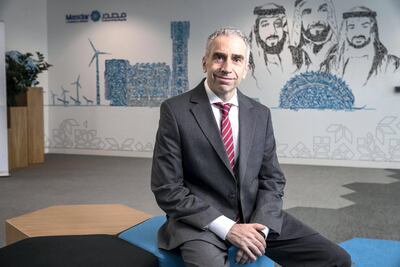These days we are constantly bombarded with ways to live more sustainably. We're told to ditch plastic bags, car-pool and even go vegan, but as busy mums and dads, it's tough to manage it all. So where should we be focusing most of our attention in order to best minimise our impact on this planet without sacrificing too much family time and money?
You could start with travel. In the UAE, many residents jet off on an average of four to six times per year, yet experts say flying is a major contributor to a family's carbon footprint. "To meet the Paris climate goals, we simply can't fly any more," says Alexander Ritschel, head of technology at Masdar Clean Energy.
This is easier said than done in a country with more than 80 per cent foreign residents, but each person is responsible for 18 tonnes of carbon emissions over a year, according to Dubai Carbon, which is more than 10 times the Paris goals of two tonnes per person annually, and four times the levels seen in European countries (Italy is five) and more than 10 times that of India (1.6). One business class flight to Bali racks up six tonnes per person, while in economy that goes down to four. Offset projects, such as tree planting initiatives, though positive, are "only a last resort and don't help too much in the long run", says Ritschel.
Many studies point to the production of meat, particularly beef, as a huge contributor to CO2 emissions, due to factors such as the huge amounts of land used in animal agriculture and methane emitted from cows. Statistics show that UAE residents consume about 80 kilograms per year, says Ritschel. That's the equivalent of half a tonne of CO2 or one return flight in economy class to Egypt, yet he adds that while a vegetarian diet is more sustainable, this cannot compare to the damage being caused by flights. "If you reduced just one flight, you can convert that meat. The footprint from flights is much, much more than anything related to food and by far the biggest factor of the carbon footprint in the UAE."
Ivano Iannelli, chief executive of Dubai Carbon, agrees. “The largest culprit in the UAE is travel,” he says, adding that it covers about 35 per cent of all carbon emissions, followed by utilities consumption (30 per cent), vehicle usage (20 per cent) and waste (15 per cent).
Then there is on-the-ground transportation to think about: with limited means of public transportation in the country, cars are still king, and drivers clock up an average 27,000 kilometres a year as opposed to the 5,000km a year in the EU, Iannelli explains. Ritschel says workers must be incentivised to live closer to work to cut out commutes, or car-pooling must be encouraged as an alternative if public transport is not available. For example, in some areas of the US, certain lanes are now reserved for car-pooling, making it quicker and easier to travel this way. "Governments can always further promote public transport systems," Ritschel adds. "For example, a train between Abu Dhabi and Al Ain would make a big impact." He says incentives for electric or hybrid cars are also much needed. In Canada, rebates and cash incentives have been used, while in the UK, a "plug-in grant" has been introduced – to name a couple of examples.
Kyle Weber is heading All The Way Green, which focuses on the import, sale and maintenance of second-hand electric vehicles from abroad, where on average they are about 20 per cent cheaper than in the UAE. "At the time when we started, EVs were not well-known in the region; some people knew about Tesla, but few had experienced a Renault Zoe, Chevy Bolt or BMW i3. So, we set out to change public perception and get more people behind the wheel," he explains. An electric vehicle is about three times more energy efficient than a conventional vehicle, but the barrier so far has been cost. Yet a simple switch from petrol to electric is not a long-term solution, either, he adds. "What we need to do to be sustainable is move towards more shared mobility systems." This includes not just buses and trains, but more community car-sharing programmes, such as like those in Masdar or Sustainable City. "We need to start taking cars off the road."

Another major contributor to a UAE household’s carbon footprint is air-conditioning. With temperatures soaring during summer, ACs account for 70 per cent of electricity use here, according to Powerwise in Abu Dhabi. Laurent Longuet, chief executive of renewable energy firm SirajPower, says it poses one of the biggest challenges to sustainable living in the region. “If the AC utilisation rate is reduced, there will be a significant drop in the country’s electricity consumption.” Ritschel says that in addition to reducing the thermostat, apartment living is more sustainable, as each home is also cooled by the units around it as well as the corridors outside. “Villas versus apartments have a disproportionately higher carbon footprint,” he explains.
Ruchir Punjabi, co-founder of Distributed Energy, an aggregation platform that connects renewable projects with funders, suggests that the simplest solution in the UAE is to switch off your AC when not home, as well as ensure temperatures are neither too high nor too low. "Using LED lights and solar panels on your rooftop can also be both carbon efficient and good for your savings in the long term," he says, adding that cold-water showers, as well as cold cycles in the washing machine, can also be beneficial to both efficiency and bills.
Head to the kitchen and you'll find myriad ways to reduce emissions, too. With a dependency on bottled water, H20 consumption also has a lot to answer for. The average person in the UAE uses up to 450 plastic bottles a year, and only a small fraction of this is recycled, says Rukhsana Kausar, founder of Liquid of Life water filters. She says switching to filtered drinking water can help reduce the carbon footprint that is associated with the production and transportation of plastic bottles, as well as save you money. "The impact can be significant for families and businesses," she says, explaining that a family of four on average uses three five gallon bottles of water a week, meaning an annual use of 624 bottles and a cost of around Dh1,248 per year. A filter installation costs less than Dh1,000 with zero waste and then the Dh600 filter must be replaced annually. "Whilst reducing plastic waste and providing everyone with access to healthier drinking water, it also reduces the family's exposure to dioxins, phthalates, BPA and also microplastics."
In your fridge, it’s not just beef that has an impact. The average UAE resident produces 2.7 kilograms of waste per day, according to Dubai Carbon, in both food and packaging. It is estimated about Dh13 billion worth of food is wasted by businesses and consumers in the country. Here, there is much families can do to reduce, including cooking at home, buying locally produced food and using reusable shopping bags. Also consider the footprint of what you’re consuming: all processes considered, from production to transportation, two cups of coffee a day contributes 310kg to annual greenhouse gas emissions, while three to five 75g servings of lamb will see a person accumulate a whopping 904kg, the equivalent of driving a regular petrol car 3,712km.
The challenges may seem huge, but change is afoot and many UAE start-ups are now making it easier with eco-friendly alternatives for the home – from chemical-free cleaning products to plastic-free toiletries. It will take a massive collective effort, but even small changes can make a difference, particularly when it comes to travel, says Ritschel. So next time you're booking your holiday, why not choose economy over business, take direct flights (as take-off is the most fuel-consumptive process) and pick a closer-to-home destination, such as Sri Lanka over Bali? We're in the right place for it, after all.
To work out your family's carbon footprint, visit www.carbonfootprint.com

